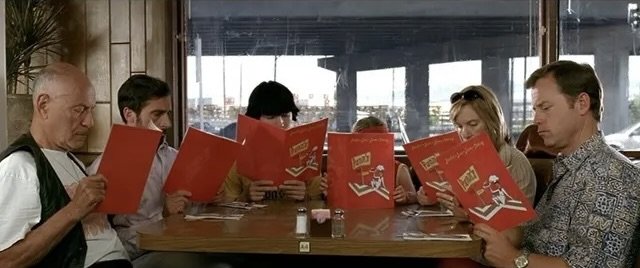Why Little Miss Sunshine Is More Than Just a Good Laugh
By Alexandra Sepe
A yellow Volkswagen bus driving away into the void of a California sunset. Cut to black.
The final scene of Little Miss Sunshine is absolutely phenomenal—you don’t know whether you should be crying, laughing, or angry that it didn’t go on forever. Arguably, this is the recipe for a great film.
Little Miss Sunshine follows the Hoover family as they road trip from Albuquerque to Southern California with a dream… of winning the Little Miss Sunshine beauty pageant! Throughout the film, as a viewer, it’s as if you’re creepily hiding out in their trunk—you get to know the ins and outs of their family dynamics, you watch their sanity disintegrate, and eventually come back together.
Even though it was released in 2006, the film addresses the complexities and realities of family dynamics in a way that still feels refreshing. Every joke lands. You laugh so hard you almost start crying, and then before you even know it, you’re actually crying. A “tragicomedy,” tackling important themes like mental health with comedic one-liners, impeccably well done, as critics have noted.
At first sight, the picture doesn’t appear to be a “big hit” or revolutionary by any means. Its cinematography and visuals aren’t particularly promising—and, to be honest, the storyline isn’t either. But the characters are so perfectly, ironically layered that you can’t help but call it genius.
Paul Dano’s character, Dwayne the tortured older brother (my favourite), is an Elliott Smith look-alike who, as an avid reader of Friedrich Nietzsche, takes a vow of silence. He carries this “pseudo-intellectual” attitude, yet his absolute dream is to become a pilot.
Visibly exhausted and a secret cigarette smoker, Sheryl lacks the “superficial” polish that many mother figures have in comedies. She’s not afraid to tell her youngest daughter, Olive (Abigail Breslin), that her uncle Frank (Steve Carell) didn’t just fall and hurt himself—he attempted suicide. Olive is seven years old.
The father, Richard, played by Greg Kinnear, is the epitome of a loser obsessed with winning. He makes comments about his daughter’s weight, lacks sympathy for his brother-in-law’s declining mental health, and is generally an unlikeable character from the start. Yet, the film works so well that, by the end, you can’t help but like and feel for him too.
Sweet little Olive embodies both innocence and the gradual way it fades within us all. At the very beginning of the film, you feel her excitement for the pageant as she’s constantly practicing her dance moves. But in the course of the film, she begins to internalize her father’s comments about not being a loser, and limits her ice cream intake to avoid gaining fat—so much so that, once in Southern California, she asks a former Miss U.S.A. winner whether she eats ice cream at all, seeking validation and approval from someone who has succeeded. The pageant winner responds, “Yes, my favorite is cherry vanilla.” So, maybe not all hope is lost overall.
Oscars don’t mean everything nowadays, but Alan Arkin took home the award of “Best Actor In A Supporting Role” in 2007 for his portrayal of Grandpa Edwin. His character is Olive’s biggest supporter, helping her prepare for her pageant performance, all while secretly snorting lines of heroin. He evokes memories of Dan Mazer’s 2016 film Dirty Grandpa, in which Robert De Niro plays a similarly irreverent yet endearing grandfather. Despite being this slightly unhinged but excellent grandpa to Olive, and not so excellent father to Richard, he delivers one of the most poignant lines in the movie when he’s trying to comfort Olive about her father: “A real loser is someone who is so afraid of losing that they don’t even try.”
To be quite frank (no pun intended), Steve Carell’s character, Uncle Frank—Sheryl’s brother and the number one Proust scholar—is one that can’t help but stick with you. He has just attempted suicide after falling in love with a graduate student who then fell for his rival: the second most renowned Proust scholar. Not to mention, he also loses his job and, well, title.
One might think that once a film introduces a topic as heavy as suicide, it would inevitably define Frank’s character. However, Little Miss Sunshine does something else. Through satirical and comedic twists, it takes the characters’ pain, insecurities, and struggles and weaves them together into a cohesive whole. They help each other make sense of their crappy situations. By the end of the film, you see Richard actively trying to protect his daughter from the cruelties of the world, not perpetuate them. You see Dwayne and Frank finding solace and understanding in one another, reminding us that what’s important is to “do what you love and fuck the rest!”
This interplay between humor and pain makes the film resonate. It sneaks up on you, and by the end, you walk away not just with that sense of immediate entertainment that most comedies offer, but also a little wiser, and for that, it’s worth a watch… or many!
4.5/5


